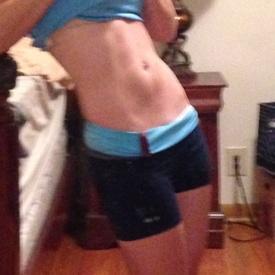what does "ruined metabolism" mean?

Mistraal1981
Posts: 453 Member
Hi, daft question incoming!
I have read a few topics now where people mentioned they have/are worried that they have ruined their metabolism. What does that mean? How do you do it? What is the impact of it? Can it be reversed?
I have read a few topics now where people mentioned they have/are worried that they have ruined their metabolism. What does that mean? How do you do it? What is the impact of it? Can it be reversed?
0
Replies
-
"Ruined metabolism" is another MFP myth, along with "Starvation mode"
Ignore it0 -
Eating at too large of a calorie deficit destroys lean body mass...i.e. muscle. Maintaining and/or gaining muscle requires a lot of calories and thus having muscle means you have a higher metabolism (it is why men in general have a higher resting metabolism than women). When you destroy that muscle mass you are destroying your metabolism.
Also, there is a natural adaption to your calorie intake that takes place...this seems to happen a lot faster when people go VLCD. Additionally, the human body will shut down "non-essential" functions like making your hair grow and what not when calorie deficits are too large.
Broken metabolisms are very difficult to repair but you can do it. It generally requires some initial weight gain as the patient begins consuming the requisite calories needed to maintain weight in someone of similar statistics as the patient. You also need to put on muscle mass. I have a very good friend that was anorexic for years and has spent literally the last 3 years repairing her metabolism.0 -
"Ruined metabolism" is another MFP myth, along with "Starvation mode"
Ignore it
Many an anorexic would strongly disagree with you....0 -
If you frequently skip meals or go a long time between them you can "slow" your metabolism down. Your body goes into "starvation" mode and will hold on to as much fat as possible like it would have done for our ancestors when there was no food around. To recover from it and speed your metabolism up, you need to eat regular meals frequently to reasure your body its getting adequate nutrition. Aim for 5-6 smaller meals a day. You won't ruin it forever unless you develop an intense eating disorder, and even then recovery is a lot of the times possible.0
-
It's just a thing people say when they really mean "it's slowed down"
If your metabolism TRULY was "ruined" and had stopped, you'd be dead.
You can "ruin" your metabolism by not eating for extending periods of time, for example. But even then it's not "ruined" as your body will switch to consuming muscle instead of fat. (which is what I assume everyone does not want) All together this is just another reason why proper nutrition and adequate calories are necessary. To reverse an otherwise slow metabolism the only thing you can do is eat the amount of calories your body needs (check out TDEE) consistently and for a prolonged amount of time.0 -
Eating at too large of a calorie deficit destroys lean body mass...i.e. muscle. Maintaining and/or gaining muscle requires a lot of calories and thus having muscle means you have a higher metabolism (it is why men in general have a higher resting metabolism than women). When you destroy that muscle mass you are destroying your metabolism.
Also, there is a natural adaption to your calorie intake that takes place...this seems to happen a lot faster when people go VLCD. Additionally, the human body will shut down "non-essential" functions like making your hair grow and what not when calorie deficits are too large.
Broken metabolisms are very difficult to repair but you can do it. It generally requires some initial weight gain as the patient begins consuming the requisite calories needed to maintain weight in someone of similar statistics as the patient. You also need to put on muscle mass. I have a very good friend that was anorexic for years and has spent literally the last 3 years repairing her metabolism.
This is a wonderful post. Perfect explanation.0 -
"Ruined metabolism" is another MFP myth, along with "Starvation mode"
Ignore it
This wrong.
While the term IS commonly overused, a ruined metabolism is very real, and occurs after sustained undereating for extended periods of time. Basically when you don't eat enough for long enough, your body no longer has the ability to regulate the rate at which it burns/stores energy. This is very common in VLCDers, and can take years to re-regulate and recover from.0 -
it's a time thing.
eating 500 calories (or less) a day for a week, because you are sick with gastro or whatever isn't going to make a difference, just be aware that when you do start eating again the scale will move up, because there is some biomass in your bowels.
however, if you strive to eat 500-600 calories a day for a prolonged period of time, it is likely that your metabolism slows down (your BMR will be lower then a 'normal' person's of that height, weight and age). To be honest though the nutritional deficits (iron, calcium etc) would worry me before the damage to the BMR, but that is just me personally.0 -
If you frequently skip meals or go a long time between them you can "slow" your metabolism down. Your body goes into "starvation" mode and will hold on to as much fat as possible like it would have done for our ancestors when there was no food around. To recover from it and speed your metabolism up, you need to eat regular meals frequently to reasure your body its getting adequate nutrition. Aim for 5-6 smaller meals a day. You won't ruin it forever unless you develop an intense eating disorder, and even then recovery is a lot of the times possible.
This is not true. It takes 72 hours of not eating for your metabolism to even adapt. Meal frequency is a complete myth.0 -
Okay, after reading these kinds of posts with interest and some skepticism, I have to ask: when people use the phrase "extended periods of time" to define going on a VLCD (which, I think we may also need to define for those who aren't sure what that is), what do you mean? What's too long? Are you talking about someone eating 1200 for 12 weeks, 1400 for 12 weeks, a person who has been engaging in anorexic behaviors for many months (4-6)?
This is why I think this phrase get's thrown around too carelessly. Someone who has been yo-yoing (eating between 12-1300 for a couple of weeks and then "falling off the wagon") but who hasn't been on a VLCD for a year might think that they're going to go into "starvation mode" when there are actual people who either suffer from an eating disorder or having been eating 1200 or less for over a year who might actually be dealing with the consequences of "starvation mode."
Anyway, I am curious to find out what the supposed time-frame before someone goes into starvation mode and at what kind of deficit or calorie range this can take place.0 -
I have to ask: when people use the phrase "extended periods of time" to define going on a VLCD (which, I think we may also need to define for those who aren't sure what that is), what do you mean? What's too long? Are you talking about someone eating 1200 for 12 weeks, 1400 for 12 weeks, a person who has been engaging in anorexic behaviors for many months (4-6)?
To me it means less than 1000 calories everyday for at least 6 weeks. It can vary from person to person on how long it takes to suffer the side-effects of eating so little. Some will start seeing signs within 6 weeks and others won't see the signs until months or even years later.0 -
If you frequently skip meals or go a long time between them you can "slow" your metabolism down. Your body goes into "starvation" mode and will hold on to as much fat as possible like it would have done for our ancestors when there was no food around. To recover from it and speed your metabolism up, you need to eat regular meals frequently to reasure your body its getting adequate nutrition. Aim for 5-6 smaller meals a day. You won't ruin it forever unless you develop an intense eating disorder, and even then recovery is a lot of the times possible.
no, no, no, no!
Starvation mode is when you eat nothing for a prolonged period of time > than 72 hours and your body starts to turn on itself for energy.
Five to six meals a day has nothing to do with starvation mode or metabolism...0 -
I have to ask: when people use the phrase "extended periods of time" to define going on a VLCD (which, I think we may also need to define for those who aren't sure what that is), what do you mean? What's too long? Are you talking about someone eating 1200 for 12 weeks, 1400 for 12 weeks, a person who has been engaging in anorexic behaviors for many months (4-6)?
To me it means less than 1000 calories everyday for at least 6 weeks. It can vary from person to person on how long it takes to suffer the side-effects of eating so little. Some will start seeing signs within 6 weeks and others won't see the signs until months or even years later.
At that calorie intake, I can definitely see why your metabolism might be compromised (it's a less sexy term than "starvation mode" but I think it describes what's happening)--and certainly at that extended amount of time. Thanks for your thoughts!0 -
Thanks for the link--I've seen this before and I think it's very thorough and useful. There is a tendency for people to come to the boards thinking they're at starvation mode because they keep a lower calorie or a larger than 20% deficit (but still not quite a 35-40% deficit) who think they're hitting "starvation mode" because they aren't losing (many times it's because they're eating more than they're logging).
I asked about the definition of terms because I think there have been so many in the past that one person might think a VLCD is 1200, while someone else thinks it's 800. For some people, three weeks might be an extend period of time, while for others it is 3 months. This may be one of the reasons why someone thinks that not eating enough for a week might be causing them to go into "starvation mode."
Thanks for the link!0 -
To me it means less than 1000 calories everyday for at least 6 weeks. It can vary from person to person on how long it takes to suffer the side-effects of eating so little. Some will start seeing signs within 6 weeks and others won't see the signs until months or even years later.
I'd agree with this. I think it would also depend on the person. I'm shortish and starting to get slim, so my BMR is only in the 1300s. Me eating 1300 calories vs a taller and heavier person eating 1300 calories would be very different.0 -
Okay, after reading these kinds of posts with interest and some skepticism, I have to ask: when people use the phrase "extended periods of time" to define going on a VLCD (which, I think we may also need to define for those who aren't sure what that is), what do you mean? What's too long? Are you talking about someone eating 1200 for 12 weeks, 1400 for 12 weeks, a person who has been engaging in anorexic behaviors for many months (4-6)?
Commercial VLCDs, as used in clinical trials and with obese patients under medical supervision, are usually 400 - 800 calories a day - Optifast for example. 6 to 8 weeks is a typical duration, perhaps 12 as a maximum.
The (in)famous Scotsman "AB" didn't eat for a year and just used up his very ample excess fat reserves.
I think you have to consider the deficit or calorie level in the context of the person's body fat and ability to supply calories from reserves, the number itself isn't that helpful.0 -
The real world definition varies greatly to what is thrown around here.
In the context of My Fitness Pal, "ruined metabolism" is usually defined as the guilt someone feels after slashing their calories more than they can REALLY commit to doing then secretly eating extra portions and sneaking those cookies at midnight. Usually followed by recording workouts that are general in the ballpark of "1500 cals burned by doing 10 minutes of walking and hour of housekeeping." The final symptom of a "ruined metabolism" is creating a post on the general diet and weight loss help forum along the lines of "3 months no progress" that usually outlines the illusion of how perfect they stick to their diets and how accurate they are with calories in vs calories out. This of course is followed by helpful advice only to be answered with extreme butthurt from the poster until someone finally tells them they are in starvation mode and that they need to eat more and move less. This is the only acceptable answer to the person with the "ruined metabolism" so they no longer have to eat their cookies in the shadows at the midnight hour and can freely log the calories thus removing the guilt they feel.
Once you leave the MFP community and rejoin the real world then a ruined metabolism has a completely different meaning and is a real thing with real science yet completely different than what you would find in the MFP universe. So, OP, which definition were you looking for?0 -
Your body adapts to what you give it....I was weight lifting 5 times per week, cardio included with three of those days and eating an average of 1300-1500 caloreis. My weight was 133 and would not go any lower no matter how hard I exercised. Of course I was not consuming enough calories to make up for what I burned through exercise. I had a bod pod completed and it showed that my resting metabolism was 800, way too low for a 5"4 female at the weight of 133. This is when I slowly increased my calories, I am now eating 1800-2100 most days and the weight has started to come off again. My metabolism was ruined so my body was holding on to the weight. I am now losing with the same amount of exercise as before but an increase of at least 500 calories more that what I was previously eating. So it is possible to ruin your metabolism.0
-
Okay, after reading these kinds of posts with interest and some skepticism, I have to ask: when people use the phrase "extended periods of time" to define going on a VLCD (which, I think we may also need to define for those who aren't sure what that is), what do you mean? What's too long? Are you talking about someone eating 1200 for 12 weeks, 1400 for 12 weeks, a person who has been engaging in anorexic behaviors for many months (4-6)?
This is why I think this phrase get's thrown around too carelessly. Someone who has been yo-yoing (eating between 12-1300 for a couple of weeks and then "falling off the wagon") but who hasn't been on a VLCD for a year might think that they're going to go into "starvation mode" when there are actual people who either suffer from an eating disorder or having been eating 1200 or less for over a year who might actually be dealing with the consequences of "starvation mode."
Anyway, I am curious to find out what the supposed time-frame before someone goes into starvation mode and at what kind of deficit or calorie range this can take place.
Unfortunately, this is difficult to answer. A person's leanness is a huge factor. Obviously those who are obese can sustain a vlcd for a lot longer than a person who is 10% body fat or 20% for females. I can tell you, I know people who have done HCG diets for various periods of time and now struggle to maintain their weight, let alone lose more weight. Some it was a three month use, some it was one year of the program.0 -
The real world definition varies greatly to what is thrown around here.
In the context of My Fitness Pal, "ruined metabolism" is usually defined as the guilt someone feels after slashing their calories more than they can REALLY commit to doing then secretly eating extra portions and sneaking those cookies at midnight. Usually followed by recording workouts that are general in the ballpark of "1500 cals burned by doing 10 minutes of walking and hour of housekeeping." The final symptom of a "ruined metabolism" is creating a post on the general diet and weight loss help forum along the lines of "3 months no progress" that usually outlines the illusion of how perfect they stick to their diets and how accurate they are with calories in vs calories out. This of course is followed by helpful advice only to be answered with extreme butthurt from the poster until someone finally tells them they are in starvation mode and that they need to eat more and move less. This is the only acceptable answer to the person with the "ruined metabolism" so they no longer have to eat their cookies in the shadows at the midnight hour and can freely log the calories thus removing the guilt they feel.
Once you leave the MFP community and rejoin the real world then a ruined metabolism has a completely different meaning and is a real thing with real science yet completely different than what you would find in the MFP universe. So, OP, which definition were you looking for?
This...pretty much.0 -
Most of the time, "ruined metabolism" is a boogey-man and meaningless term used to explain lack of weight loss progress.
I say most, because I suppose someone could have very little muscle mass left after severe dieting, plus additional slight decrease in BMR from adaptive thermogenesis.
However, this is nothing that can't be fixed, contrary to what the word "ruined" implies.
Most of the time, it's BS.0
This discussion has been closed.
Categories
- All Categories
- 1.4M Health, Wellness and Goals
- 397K Introduce Yourself
- 44.2K Getting Started
- 260.9K Health and Weight Loss
- 176.3K Food and Nutrition
- 47.6K Recipes
- 232.8K Fitness and Exercise
- 456 Sleep, Mindfulness and Overall Wellness
- 6.5K Goal: Maintaining Weight
- 8.7K Goal: Gaining Weight and Body Building
- 153.3K Motivation and Support
- 8.3K Challenges
- 1.3K Debate Club
- 96.5K Chit-Chat
- 2.6K Fun and Games
- 4.5K MyFitnessPal Information
- 16 News and Announcements
- 18 MyFitnessPal Academy
- 1.4K Feature Suggestions and Ideas
- 3.1K MyFitnessPal Tech Support Questions
















